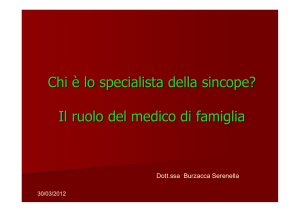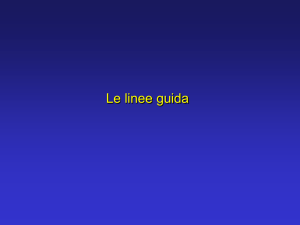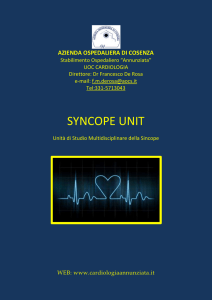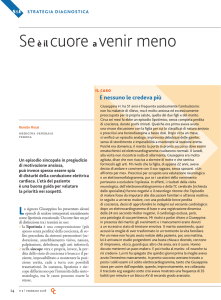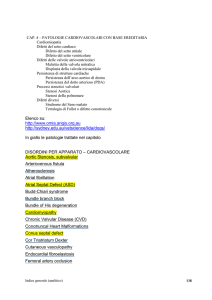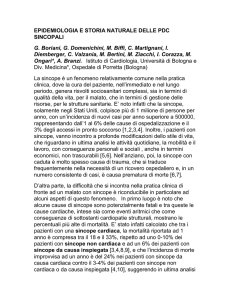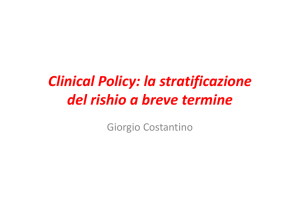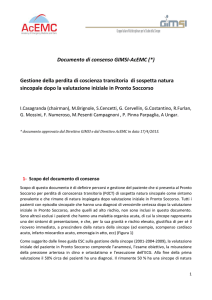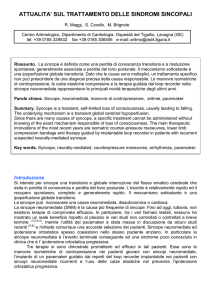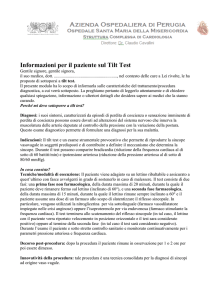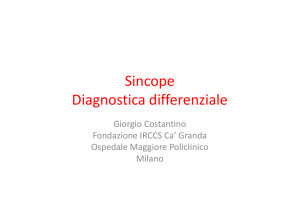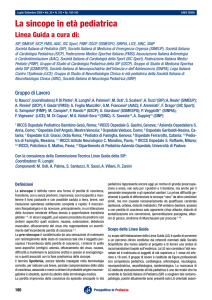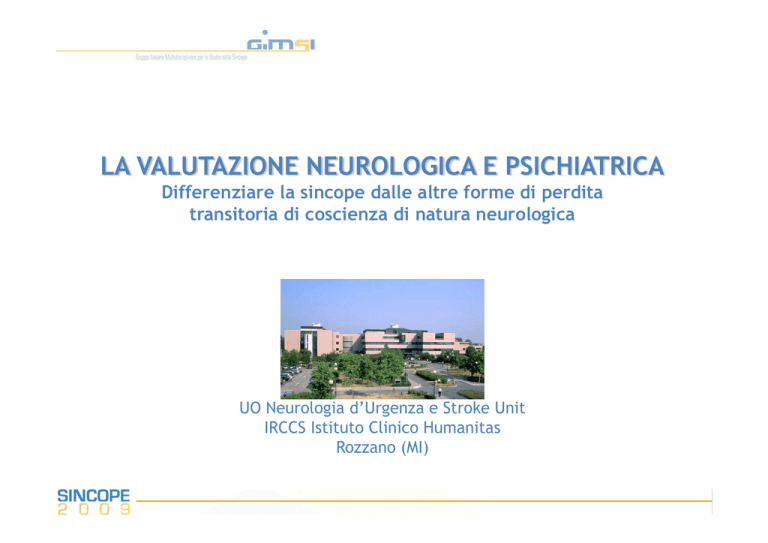
LA VALUTAZIONE NEUROLOGICA E PSICHIATRICA
Differenziare la sincope dalle altre forme di perdita
transitoria di coscienza di natura neurologica
Giuseppe Micieli
UO Neurologia d’Urgenza e Stroke Unit
IRCCS Istituto Clinico Humanitas
Rozzano (MI)
Quadri clinici di maggior
frequenza in P.S.
Progetto NEU, 2003
Che cosa non è sincope
¾ Perdita di coscienza dovuta a
trauma
¾ Perdita di coscienza non
transitoria e non a
regressione spontanea
¾ Perdita di coscienza
transitoria e a regressione
spontanea non dovuta ad
ipoafflusso cerebrale
¾ Situazioni in cui non vi è una
reale perdita di coscienza
¾ Concussione
¾ Coma, disturbi metabolici,
intossicazione, “aborted sudden
death”
¾ Epilessia
¾ Cadute, drop attack, disturbi
psichiatrici, cataplessia,
vertigini, presincope
Causes of syncope in an outpatient cohort
(structural heart disease excluded)
Strano S et al. JNNP 2005;76:1597-1600
Sincope e Ipoperfusione Cerebrale
MTT map
35 mL/100 g/min
20 mL/100 g/min
Coutts SB et al, Neurology 2003
Wiebers et al, 1997
Subclavean steal syndrome
Filis K et al. J Med Case Report 2008;2:392
Sincope da
compressione
estrinseca
dell’arteria
vertebrale sinistra
nel suo tratto
extracranico
Sakaguchi M et al, Neurology 2003
Sincope e malattia
cerebrovascolare:
compressione
estrinseca
dell’arteria
carotide interna di
sinistra secondaria
a tumore del glomo
carotideo
Misdiagnosis
Syncope
Epilepsy
“Hardly anyone with epilepsy will come to any harm
from a delay in diagnosis whereas a false positive
diagnosis is gravely damaging”.
“Improper pacemaker implantation in patients with fits and
falls of neurological origin”
The co-existence in the same subjects seems to be rare
Misdiagnosis of epilepsy in three population-based
and three cohort studies of patients with presumed
seizure disorder
Bergfeldt L. Heart 2003;89:353–358
Question
Points (if
yes)
At times do you wake with a cut tongue after your spells?
2
At times do you have a sense of deja vu or jamais vu before
your spells
1
At times is emotional stress associated with losing
consciousness?
1
Has anyone ever noted your head turning during spell?
1
Has anyone never noted that you are unresponsive, have
unusual posturing or have jerking limbs during your splells or
have no memory of your spells afterwards?
1
Has anyone ever noted that you are confused after a spell?
1
Have you ever had lightheaded spells?
-2
At times do you sweat before your spells?
-2
Is prolonged sitting or standing associated with your spells?
-2
Seizures: score >1; Syncope: score<1
Sheldon et al,J Am Coll Cardiol 2002
CAUSES OF SYNCOPE
Neurally-mediated reflex syncopal syndromes
Vasovagal Faint (common faint)
Carotid sinus syncope
Situational Faint
Acute haemorrage
Cough, Sneeze
Gastrointestinal stimulation
Micturition
Post-exercise
Others
Glossopharyngeal and trigeminal neuralgia
Task Force on Syncope, ESC 2004
Cough Syncope
CAUSES OF SYNCOPE
Orthostatic
Autonomic Failure
Primary Autonomic Failure syndrome
(e.g. Pure Autonomic Failure, Multiple System Atrophy,
Parkinson’s Disease with Autonomic Failure)
Secondary Autonomic Failure syndromes
(e.g. Diabetic Neuropathy, Amyloid Neuropathy)
Drug and Alcohol
Volume Depletion
Task Force on Syncope, ESC 2004
Baroreflex arc
Influencing factors
• Origin and strenght of stimulus
• Set point of the reflex
• Input from higher centres
• Responsiveness of cardiovascular
receptors and organs
• Neurohumoral and vasoactive
substances
• Interactions of the aortocarotid
with chemoreflex arc
+-
AVP
-
NTS
VLM
MSA
Arterial Blood Pressure
PAF
PD
IML
SG
a
NE
Multiple System Atrophy
This disorder encompasses:
• Olivoponto-cerebellar atrophy (OPCA)
– Sporadic late onset predominantly cerebellar syndrome (but
with additional parkinsonism and dysautonomia).Dejerine and
Thomas (1900)
• Shy-Drager syndrome (SDS)
– Neurogenic central autonomic failure in patients who also had
parkinsonism and cerebellar signs. Shy and Drager (1960)
• Striato-nigral degeneration (SND)
– Rapidly progressive parkinsonism (but also cerebellar signs and
dysautonomia). Adams et al. (1961)
Graham and Oppenheimer (1969)
Autonomic Failure in PD
• Constipation
• Urinary incontinence
• Orthostatic or post-prandial
light-headedness
• Heat or cold Intolerance
• Decreased bowel sounds
• Orthostatic hypotension
SYNCOPE AND FALLS
30% cognitively normal elderly people are unable to
recall documented falls three months later
50% a withness account for syncopal events unavailable
40% of patients with an attributable diagnosis of carotid
sinus syndrome, the only presenting symptoms were
falls alone or falls with dizzines (syncope was denied)
20% Amnesia for loss of consciounsness demonstrated in
patients with a diagnosis of carotid sinus syndrome
FE Shaw and RA Kenny, 1997
Diagnostic algorithm in patients with
suspected NES
Muller T et al. Seizure 2002;11:85-89
Alsaadi TM, Vinter Marquez A. Am Fam Physician 2005;72:849-856
Features suggesting a diagnosis of
psychogenic nonepileptic seizures
Alsaadi TM, Vinter Marquez A. Am Fam Physician 2005;72:849-856
Point of care:
accident and
emergency
department
Petkar S et al.
Postgrad Med J 2006;82:630-641
False negative
&
False positive
diagnoses
MOULIN T et al, 2003
Discharge
diagnosis
MOULIN T et al, 2003
Emergency
Room
SYNCOPE
Cardiologist
Neurologist
Syncope
Unit
GP

